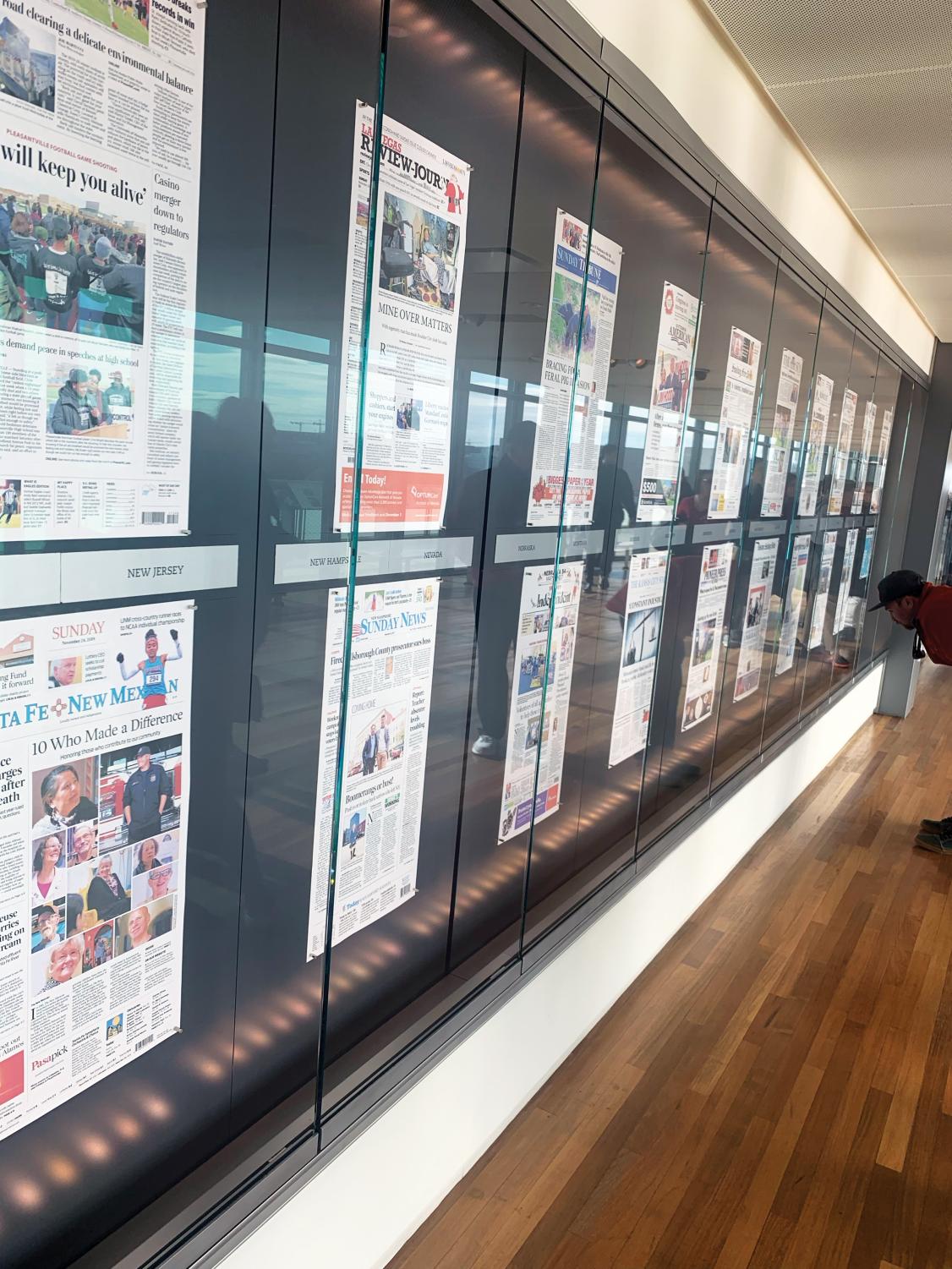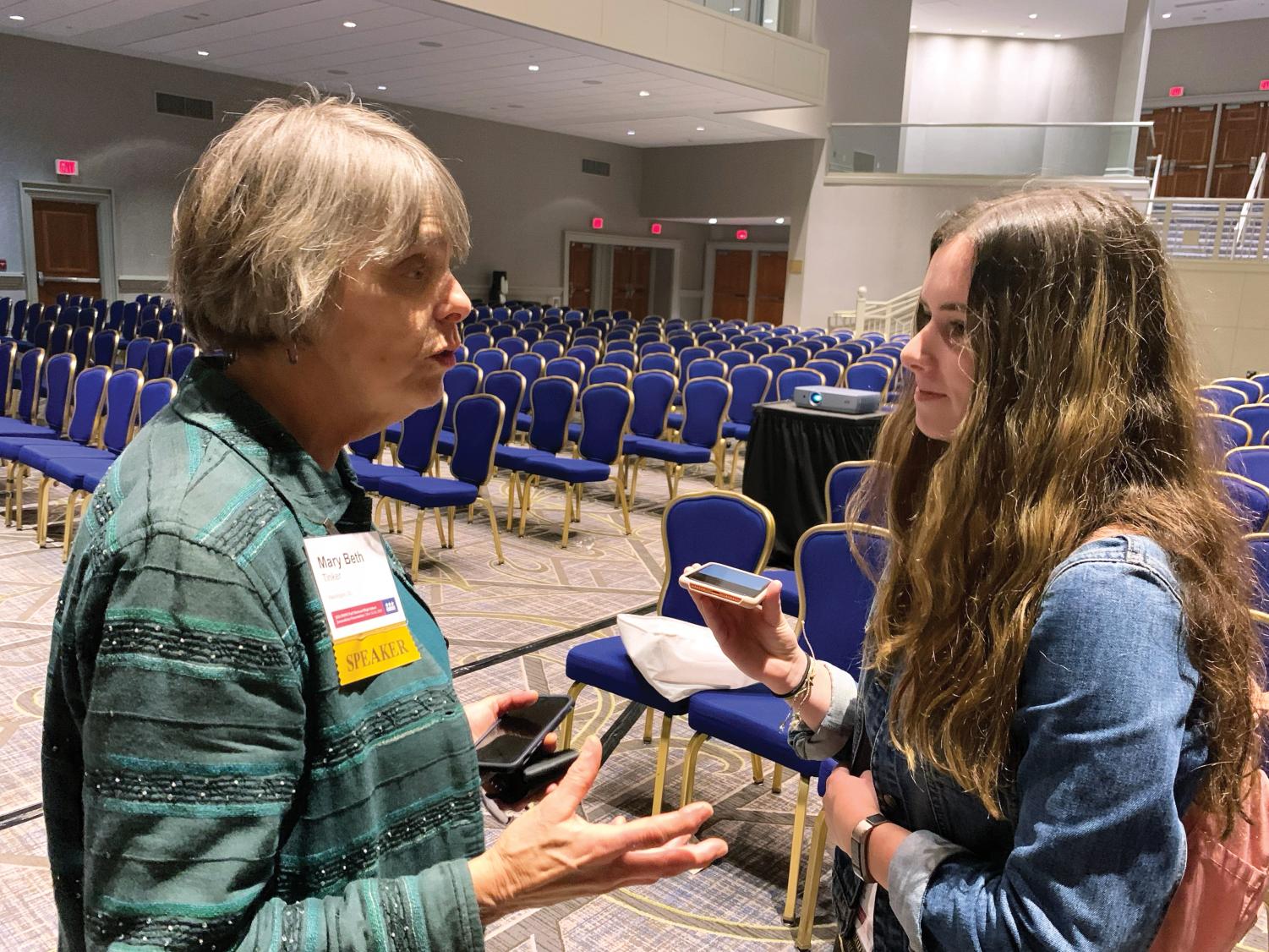Voices matter
In an era of misinformation, free press essential to maintaining democracy
December 4, 2019
Ever since she was 13, Mary Beth Tinker has stood up for students’ rights. According to Tinker, youth voices in journalism are more important than ever as issues such as climate change, racial injustice and economic injustice become increasingly prominent.
“Journalism is like having a microphone for speaking about these issues,” Tinker said. “Not just speaking about them but changing these issues and making them better.”
Limits of free speech
 In 1969, 13-year-old Tinker along with two others, decided to wear black armbands in protest of the Vietnam War. School administrators ordered the students to end the protest, but Tinker refused and sued under the First Amendment. The conflict made its way to the Supreme Court where the justices ruled in favor of Tinker, saying students do not “shed their constitutional rights to freedom of speech or expression at the schoolhouse gate.”
In 1969, 13-year-old Tinker along with two others, decided to wear black armbands in protest of the Vietnam War. School administrators ordered the students to end the protest, but Tinker refused and sued under the First Amendment. The conflict made its way to the Supreme Court where the justices ruled in favor of Tinker, saying students do not “shed their constitutional rights to freedom of speech or expression at the schoolhouse gate.”
Despite the protections given by Tinker v. Des Moines, the fight for students’ First Amendment rights continues today. According to the Student Press Law Center (SPLC), the Supreme Court has since chipped away at these rights through rulings such as Hazelwood School District v. Kuhlmeier of 1988, in which the court ruled to allow school administration to censor student media content if the media is not entirely student run.
In response to rulings such as Hazelwood, the New Voices movement was born, advocating for its own legislation that protects students’ free press rights. According to SPLC, New Voices laws have been passed in 14 states.
According to Mark Goodman, a journalism professor at Kent State University and Knight Chair in Scholastic Journalism, New Voices legislation has no negative impact on schools.
“High school education is just as healthy and vibrant in Iowa (with New Voices) as it is anywhere else in the country,” Goodman said. “The fact that the students have strong free press protections because of their state law has not made it any harder for schools to do their job educating.”
The Minnesota New Voices bill is active in both the state House and Senate.
Although many student newspapers struggle with censorship, publications often find themselves in conflict with constituent communities over their coverage, such as Northwestern University this past month.
After covering former Attorney General Jeff Sessions’ Nov. 5 visit to the University and accompanied protests, The Daily Northwestern took down its own coverage of the event in response to complaints. Professional media picked up the story and took sides over the paper’s self-censorship.
Joey Safchik, a junior at Northwestern University and the news director of the University’s broadcast station, said the station decided to leave its video coverage of the event up in contrast to the Daily’s decision and despite take-down requests.
“We all agreed that what we did is by no means malpractice and was journalism. This was a protest, they were in a public space, they were adults protesting and we were comfortable with our coverage,” Safchik said. “We continued owning and publishing the story for weeks after because we think that informing the campus is what we are here to do.”
If it weren’t for journalism in its many different forms, we would have to rely only on those people in power and what they tell us. Journalism, in its best incarnation, is the independent telling of the truth and the relaying of facts that we as community members can base our decisions on.
— Mark Goodman, professor at Kent State University
Where free speech and press meet
A citizen’s right to free speech is intertwined with the right to free press, according to Goodman, as the press offers a medium for expression and only through it can an individual be informed.
“(We) must remember how closely tied free press and free speech are,” Goodman said. “The moment we start tolerating restrictions on press freedom is the moment the free speech rights of individuals can be curtailed as well.”

Front pages from every state and some countries are displayed at the Newseum Nov. 24. The papers represent the pressing issues in a variety of locations, allowing for the dissemination of key information to the public.
Tinker said journalists must continuously fight for their right to publish stores in the face of attempted suppression.
“We are living in mighty times when there are so many important decisions to be made about the directions of our communities, our country and our world,” Tinker said. “Journalism is under attack by some forces in our country and that’s not right because we need the free press for democracy.”
In addition to helping inform the public, Safchik said high school and college newspapers allow student journalists to gain experience and find their passion.
“Having students who are well trained in the art of journalism, who will take their job seriously and will have a real passion for doing the news and doing it right could be (what) brings our democracy into the 21st century in a safe and productive way.”
According to Goodman, the free press most importantly connects the public with the truth, allowing for a more informed society.
“If it weren’t for journalism in its many different forms, we would have to rely only on those people in power and what they tell us,” Goodman said. “Journalism, in its best incarnation, is the independent telling of the truth and the relaying of facts that we as community members can base our decisions on.”
Free expression at home
Sophomore Jacob Khabie said access to school newspapers allows students to understand the importance and the impact of local events.
“A student-run newspaper really helps bring out opinions that aren’t being directed by the administration,” Khabie said. “Student voices (can) really help us get through situations.”

Junior Talia Lissauer interviews Mary Beth Tinker at the JEA/NSPA Fall Convention Nov. 22. Tinker has spent decades advocating for student press rights following her involvement in a Supreme Court case over the issue.
According to freshman Lauren Thon, the Echo’s coverage of the controversial bathroom practice gave students a voice in the school.
“With the bathroom policy and how people couldn’t really say what they want without being in fear of administration taking it down, (students) shouldn’t have had to worry about that,” Thon said.
Student journalism is important because the issues facing students in schools are not always covered by professional media, according to Goodman.
“Students have historically been on the forefront of every sort of major social change we’ve made in this country,” Goodman said. “(Student journalism) is a window into a world that we would not otherwise have.”
According to Thon, she feels as though her right to free speech is somewhat suppressed in the school.
“People should be able to express themselves and show their opinions and thoughts,” Thon said. “(In school) I am being limited on what I can say and even if I believe in something, I can’t really say it because of how the school is.”
Junior Rachel Stein said free speech is important for all — journalists and non-journalists alike.
“Free speech is really important in my life and the life of others in order to express ourselves and our beliefs,” Stein said. “It’s very important to have student-run newspapers because it allows people partaking in the newspaper to learn journalism, but then also for the student body to be educated on what is going on in our school.”

Mary Beth Tinker • Dec 13, 2019 at 10:44 am
Great article, and what an important time for youth voices and the First Amendment!